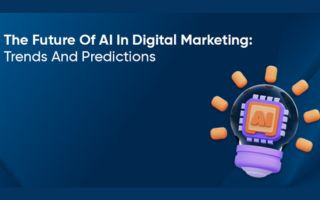Artificial Intelligence (AI) is rapidly becoming a cornerstone of digital marketing, driving innovation and efficiency. As we look to the future, AI’s influence will only deepen, reshaping how brands connect with audiences and optimize their strategies. Here’s a look at the key trends and predictions for AI in digital marketing.
1. Hyper-Personalization
AI’s ability to analyze vast datasets allows for unprecedented levels of personalization. By examining user behaviors, preferences, and interactions in real time, AI can deliver highly tailored content and recommendations. This goes beyond simple segmentation, creating a unique experience for each user.
Prediction: Expect a significant rise in hyper-personalized marketing. AI will enable brands to engage consumers with content and offers that are intricately aligned with their individual interests and behaviors, driving higher engagement and conversion rates.
2. Predictive Analytics
AI excels in predictive analytics, helping marketers anticipate future trends and consumer behaviors. By processing historical data and recognizing patterns, AI can forecast market changes and customer needs more accurately than traditional methods.
Prediction: More businesses will leverage AI for predictive analytics to optimize their marketing strategies, leading to more proactive decision-making and better resource allocation.
3. Content Creation
AI tools are increasingly capable of generating content—from blog posts to social media updates. Natural Language Processing (NLP) advancements mean AI can produce content that is engaging and contextually relevant, mimicking human writing styles.
Prediction: AI-generated content will become more sophisticated and widely adopted, allowing marketers to scale their content production and quickly adapt to new trends.
4. Voice and Conversational AI
With the rise of smart speakers and virtual assistants, optimizing for voice search is crucial. Conversational AI, such as chatbots, is also enhancing customer interactions by providing real-time assistance and support.
Prediction: The integration of voice and conversational AI will become more prevalent. Brands will use these technologies to offer seamless and interactive customer experiences, improving engagement and satisfaction.
5. Ad Targeting and Optimization
AI revolutionizes ad targeting by analyzing user data to pinpoint the most responsive audiences. It also allows for dynamic ad optimization, adjusting in real-time based on performance metrics.
Prediction: Expect more precise ad targeting and real-time optimization as AI tools become more advanced. This will lead to better ROI and more effective advertising campaigns.
6. Ethics and Data Privacy
As AI’s role in digital marketing grows, so do concerns about data privacy and ethical use. Marketers must navigate regulations like GDPR and ensure transparency in data collection and usage.
Prediction: Ethical AI practices and data privacy will be major focuses. Businesses will adopt stricter guidelines and transparent practices to build consumer trust and comply with regulations.
7. Customer Insights
AI provides deep insights into customer behavior and sentiment by analyzing data from various sources. This helps brands understand their audience better and tailor their strategies accordingly.
Prediction: The use of AI for customer insights will expand, enabling marketers to develop more targeted and effective strategies based on a comprehensive understanding of consumer preferences.
8. Automated Customer Journey Mapping
AI can automate the mapping of customer journeys, offering insights into user interactions across different touchpoints. This helps in identifying and addressing gaps in the customer experience.
Prediction: Automated customer journey mapping will become more refined, allowing for improved customer experience and more effective marketing strategies.
Conclusion
AI is set to revolutionize digital marketing with its capabilities in hyper-personalization, predictive analytics, and content creation. As these technologies advance, marketers will need to stay abreast of new developments while addressing ethical and privacy concerns. Embracing AI’s potential and integrating it thoughtfully into marketing strategies will be key to driving future success.


